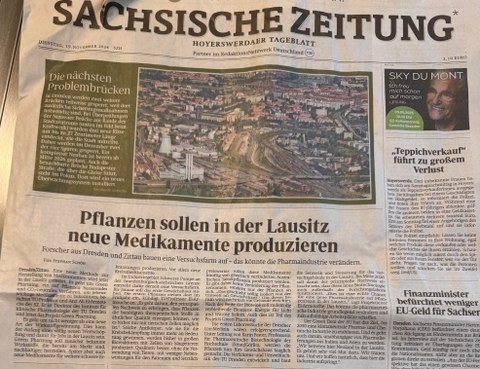Nov 22, 2024
Article in the Sächsische Zeitung about the Green Pharming project
This article appeared in the Sächsische Zeitung, Hoyerswerdaer Tageblatt, on November 19, 2024.
Author: Stephan Schön.
Plants to produce new medicines in Lusatia
Researchers from Dresden and Zittau are setting up an experimental farm - which could change the pharmaceutical industry.
Dresden/Zittau. A new method for producing medicines is now being tested in Lusatia. It's all about green pharming, a plant-based and CO2-neutral process for obtaining vital medicines, TU professor and doctor Ali El-Armouche tells the SZ. He is Director of the Institute of Clinical Pharmacology at TU Dresden and heads the Green Pharming project.
It is about nothing less than a new way of obtaining active ingredients. This could be the beginning of a completely new way of creating value and thus jobs in Lusatia. Green Pharming is initially intended to produce known active ingredients that are already on the market more sustainably. Later, however, new drugs for other serious illnesses will also be produced. Especially new cancer drugs.
An experimental farm is currently being built for this purpose in the Schwarze Pumpe industrial area on the Brandenburg-Saxony border. The first greenhouse should be ready by January. The first plants will move in there in the spring, announces TU Professor El-Armouche. "The aim is to provide proof of principle that plants can produce the required therapeutic substances in a similar quality to what has only been possible with animal cells to date." Such antibodies, which are becoming increasingly important in the fight against cancer, have so far been produced in large bioreactors using mammalian cells. In future, genetically modified Australian tobacco plants will be used to produce these drugs with better quality, without the use of animals, with fewer side effects for patients and ultimately at a lower cost. There is no modification of the plant seeds, only of the plants themselves. "This happens completely isolated from the environment in the greenhouse." Another building is erected around this. Once the proteins have been harvested, the remaining biomass will also provide energy for light and heat. This is also part of the Green Pharming project.
The first laboratory tests at Dresden University Medicine were promising. Under the direction of Karin Fester, Professor of Pharmaceutical Biotechnology at the Zittau/Görlitz University of Applied Sciences, the plants are now being made suitable for the greenhouse. The Process and Environmental Engineering department at TU Dresden is developing and building the sensors and control system for the test building in Lusatia. By mid-2026, this should provide proof of principle that this new biotechnology also works outside of research laboratories. "This is a real opportunity for a new plant-based pharmaceutical industry in Lusatia," says project manager El-Armouche. This could fundamentally change the pharmaceutical industry and create sustainable jobs.
The EU's Green Deal aims to establish a climate-neutral pharmaceutical and chemical industry by 2050. And it is also about becoming less dependent on pharmaceutical supplies from India and Asia. "We are breaking new ground here in Lusatia. It takes a lot of courage. We are daring. And, of course, we hope that the industry will jump on board."

